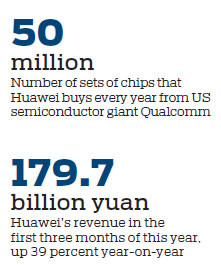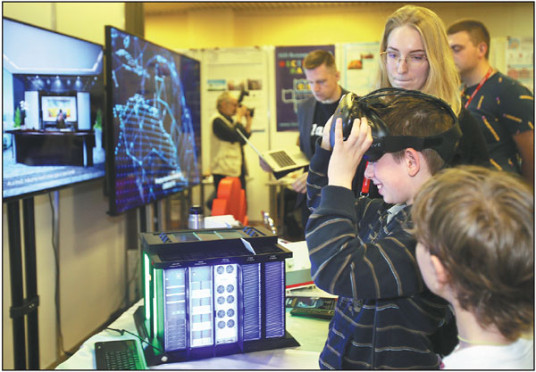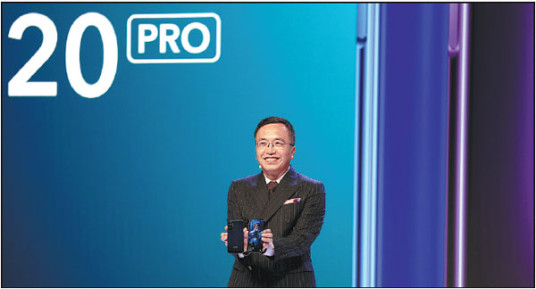Huawei ready for 'worst-case scenario'
Easing of restrictions doesn't mean much, founder of telecom company says
As Huawei Technologies Co faces arguably its biggest challenge in its 30-year-plus history, the company's 74-year-old founder Ren Zhengfei wants to show the world that Huawei is prepared for a worst-case scenario.
Instead of responding to the US-led crackdown on Huawei with anger, Ren, who is also the CEO of Huawei, said he is still of firm belief that global cooperation is a must to take the telecom industry forward.

"Huawei is now like a plane, working hard to fly back (to our base) while fixing (the holes on) its body," Ren said during an interview on Tuesday. The plane Ren is referring to is an Ilyushin Il-2 aircraft, which kept flying despite being hit by antiaircraft shells and machine-gun fire and managed to make its way back home during the World War II. The image of the aircraft is featured in a poster of Huawei's internal portal. Its tagline reads: Heroes are forged, not born.
These words mirror how Huawei, the world's largest telecom equipment maker and second-largest smartphone vendor, is dealing with the US government's ban which forbids it from buying US technologies without special approval.
'We are well-prepared'
Though wings of "our plane" have been struck, the core part of the "aircraft" is based on self-developed components using world-leading technologies, Ren said. "We are well-prepared for such a scenario with a Plan B (for all high-end components)," he said.
In a two-and-half-hour interview with Chinese media, he said the US government's decision to ease its ban on Huawei for 90 days "doesn't mean much", for the company has already made sound preparations for the restrictions.
"We can make the chips that we bought from US companies, but it does not mean we will stop buying chips from them. Instead, we should grow together," Ren said.
"We don't want to do harm to friends," he said. "We want to help them achieve good balance sheets."
According to him, during the "peace period", half of the company's chips were from US companies, while the remaining half was developed by itself. Currently, Huawei buys at least 50 million sets of chips every year from US semiconductor giant Qualcomm Inc.

"If there is a supply shortage, we have a backup," said Ren, who founded Huawei in 1987. Huawei's chip-designing arm HiSilicon is now capable of designing processors for smartphones, servers, artificial intelligence products and others.
HiSilicon President He Tingbo said in an internal letter last week: "We have been developing backup products for years. Such efforts can ensure strategic safety of most of the company's products and continuous supply of most products."
When it comes to the operating system for smartphones, Huawei has developed its own version, which could hit the market as early as this autumn. Huawei's OS is expected to replace Google's Android operating system in its smartphones in case the US tech company restricts its use on Huawei devices in compliance with the US ban.
These moves are all part of Huawei's efforts to prepare for actions from the US government, which accuses it of posing national security risk. The Shenzhen-based company repeatedly denied the accusation and said these charges were not supported by factual evidence.
Last week, US President Donald Trump signed an executive order restricting US telecom carriers from buying products from companies deemed as national security risks. Separately, the US Commerce Department added Huawei and its 70 affiliates to an Entity List, which banned the company from buying parts and components from US companies without prior government approval.
On Monday, the US said it had temporarily eased restrictions and issued a 90-day license to allow Huawei to purchase US technology in order to maintain existing networks and provide software updates for existing Huawei handsets.
Home industry to get boost
Wang Peng, deputy head of China Center for Information Industry Development, a think tank, said the move signifies the US has realized that cutting off all supplies to Huawei would hurt the interests of millions of its people.
"Some small US mobile carriers, for instance, bought Huawei's cost-effective products to build their existing rural networks. A sizable number of overseas consumers also use handsets from Huawei," Wang said.
Last year, Huawei bought $11 billion worth of products and services from US companies. Some US semiconductor companies, like Qorvo, get about 10 percent of their revenues from Huawei, according to a report by financial services company Credit Suisse.
John Neuffer, president of the Semiconductor Industry Association, which represents US chipmakers and designers, said in a statement that the association hopes to work with the administration to broaden the scope of the 90-day license.
According to Ren, the current difficulties can spur China to develop its own semiconductor industry in a systematic manner. "Pouring in money is not enough; talent, including mathematicians and physicists, is needed to develop the homegrown chip sector."
"Global talent is also needed. It is very difficult to rely solely on China's independent innovation to succeed. Why can't we embrace the world and rely on global innovation?" Ren said.
During the interview, Ren thanked the US companies that have helped Huawei grow in the international tech arena, adding that many of its consultants are from the US companies, including IBM.
"Our friendship with them was formed years or decades ago," Ren said, adding that if US companies can get government approvals, Huawei would still want to buy large quantity of components from them and maintain normal trade cooperation.
"Building an information society for human beings requires joint efforts," Ren said.
According to him, many small US companies have super-precision products.
"In our business (5G), Huawei is at the forefront, but when it comes to comparison between countries, we are still far behind the US," Ren added. US technology has the depth that Huawei can learn from, Ren said.
5G tech leader
Huawei has evolved into a global giant with a sprawling presence in businesses, including smartphones, cloud computing, artificial intelligence and semiconductors. Its products and services are available in more than 170 countries and regions.
In the first three months of this year, Huawei posted a revenue of 179.7 billion yuan ($26.8 billion), a 39 percent year-on-year growth, despite challenges it faces in some international markets.
Ren said while the US ban may slow the company's growth, it will not go through an extreme shortage of supplies.
When it comes to 5G, the next-generation mobile communications technology, Huawei has maintained its edge. Ren highlighted that the company's 5G plan will not be affected by the current challenges.
"Rivals will not be able to catch up with Huawei's 5G technology for two to three years," he said.
By the end of March 2019, Huawei had signed 40 commercial contracts for 5G with leading global carriers, and shipped more than 70,000 5G base stations to markets around the world. These figures represent the industry's largest.
Ren said that despite the US efforts to make its allies to ban Huawei, the company maintains close ties with European companies. He said its 5G features are well-suited for Europe.
"For instance, 5G capacity is 20 times that of 4G, and its power consumption 10 times less. And the size of 5G base stations is much smaller than those of 4G, allowing them to be conveniently installed even in sewers. We use materials that do not corrode for decades. These are well-suited for Europe, where many old cities do not have places to build giant telecom towers and install big base stations," Ren said.
The US-led crackdown on Huawei has been interpreted by some observers as the beginning of a new Cold War between China and the US in advanced technology.
Washington's stand on Huawei, along with the intensified conflict over bilateral trade issues, has boosted popular support for the company in China. Some people have called for supporting Huawei by boycotting Apple, a US tech company.
Ren, however, says: "Supporting Huawei in these difficult times does not necessarily mean you should buy a Huawei smartphone. It is wrong to say those who use Huawei devices are patriotic, while those who choose Apple products are not."
"Business has nothing to do with politics," Ren added.

 |
|
Top: A visitor tries out Huawei's 5G technology at a science and technology exhibition in Kiev, Ukraine, earlier this month. Chen Junfeng / Xinhua Above: President of Huawei's Honor brand, George Zhao, launches the Honor 20 range of smartphones at an event in London, Britain, on Tuesday. Peter Nicholls / Reuters |
